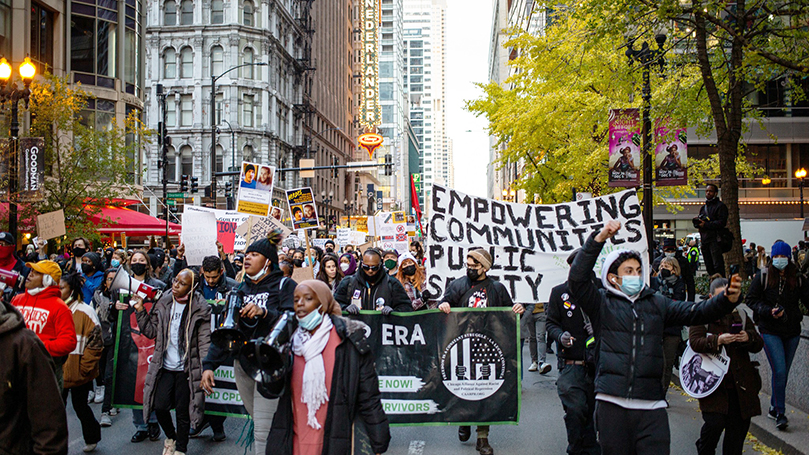
On February 28th, for the first time in history, Chicago residents held a democratic vote to enact real police accountability. Three community members from each of the 22 police districts were elected as District Council members, newly formed bodies that will in turn guide the work of the newly formed Community Commission for Public Safety and Accountability (CCPSA), and that will nominate its members. The CCPSA is the seven-member, city-wide body that now has significant powers over the Chicago Police Department. These new democratic bodies were created by the 2021 EPCS ordinance, which was itself the result of a decade-long struggle for community control of police.
The campaign has been led by a coalition of community members who have experienced police violence themselves and within their communities. The only way to end the police tyranny plaguing Black and Brown communities is for those communities to gain control over who polices them and how they are policed. Those who have faced the brunt of police terror will determine how it ends.
ECPS history
Starting in the 1960’s, Black Panther Party (BPP) leader Fred Hampton fought actively for community control of the police. This campaign included the demand for community police boards in each Chicago district with hiring and firing powers in instances of abusive police chiefs, and power over the budget. In response to this and other positions and ideas advocated by Hampton and the BPP, the revolutionary leader was assassinated by the FBI and police. Under Chicago Mayor Richard Dayer, the community control of police campaign was suppressed.
Then, in 1972, in reaction to racist murders by the Chicago Police, the department created the Office of Professional Standards (OPD). This was an accountability body run by the police themselves and notorious for conducting “sloppy investigations” and stifling misconduct investigations. Frequently, if a police officer felt a crime was not committed, it was dropped.
In 2007, after a series of CPD murders, the accountability body was dissolved and re-formed as the “Independent Police Review Authority.” While this body was not substantially different from what preceded it, the reconfiguration reflected the fact that thousands of people were engaged in collective struggle, fighting for police accountability. Each version of these councils led to increasingly radical and deeper demands for justice against the police to be taken seriously.
Following the 2012 killing of 22-year-old Rekia Boyd by a racist, off-duty police detective named Dante Servin, the Chicago Alliance Against Racist and Political Repression (CAARPR) and The Grassroots Alliance for Police Accountability (GAPA) began a 10-year process of building a movement rooted in the needs of the community. Survivors of police violence and community members campaigned in working-class neighborhoods in Chicago and spoke of the pain their communities experienced at the hands of the Chicago police.
During the 2020 George Floyd uprisings, which mobilized millions of people against the white supremacist police system, GAPA and CAARPR held major rallies, organizing community organizations around their collective needs. They connected the assaults Black brothers and sisters disproportionately face in the form of police murder and mass incarceration to other aspects of political repression in the U.S., which includes the use of torture. Throughout this period there were hundreds of meetings, rallies, public hearings, and speak-outs, which emphasized that the only way to break the cycle of violence on Black working-class people, was to have survivors of police terror and their families assert their right to justice.
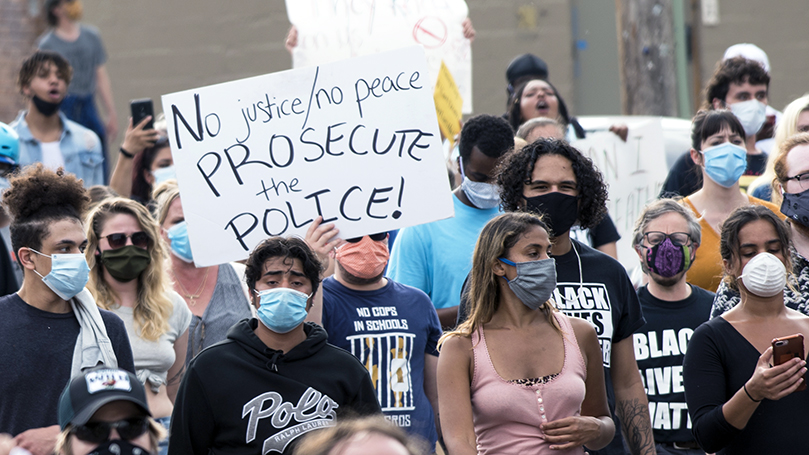
This led to the Empowering Communities for Public Safety (ECPS) ordinance that created the District Councils. GAPA and CAARPR formed a coalition to pass the ordinance that would create the Commision for Public Safety and Accountability (CCPSA), which would have the following powers:
- Directly investigating crimes of police violence
- Final say over Chicago Police Department policy
- Hiring the Chief Administrator of the Civilian Office of Police Accountability (COPA) confirmed by the city council confirms
- Firing the COPA Chief Administrator for egregious acts or omissions, “including gross misconduct or criminal conduct”
- Holding hearings about police superintendents
- Identifying and recommending preventative, proactive, community-based, and evidence-based solutions to violence
In 2021, the ECPS ordinance was passed with overwhelming support as a result of the community effort, despite opposition from Mayor Lori Lighfoot.
A collective community demand
Historically, the relationship between police and Black people and the working class as a whole in the U.S. has always been violently antagonistic and racist, with Black people experiencing the brunt of the attack. Although past campaigns to hold the police accountable combined the collective experience and frustration of Chicagoans, institutions formerly set up to respond to instances of police violence did not have democratically elected leadership, and were an extension of the police force itself.
Tuesday’s vote represented the collective needs of thousands who have been subjected to criminalization. For many candidates, this was the first time they ran for office, and they spoke powerfully about the trauma they have experienced at the hands of the police and why they want to run. Time and time again, these candidates spoke about wanting to use their role in the Commission to bring justice to their loved ones, and to collectively heal alongside their community.
Many of the candidates knew fellow community members who were killed or brutalized by Chicago police.
Cynthia McFadden’s father “escaped white supremacist terror in the South by coming to Chicago during the Great Migration, only to be shot and killed by police at 47th and King Drive on the day he arrived.”
Coston Plummer’s older brother was “tortured for 39 hours and forced to falsely confess to murder by [the] notorious commander Jon Burge when he was just 15 years old, and remains in prison today.”
Criag Carrington sister was “brutalized and arrested for protecting her children from police in 2004,” and he promised her that if he ever could, he would do something about it.
For these individuals and many others, this campaign represents the desire for communities impacted by police violence to experience justice and to prevent this violence from continuing.
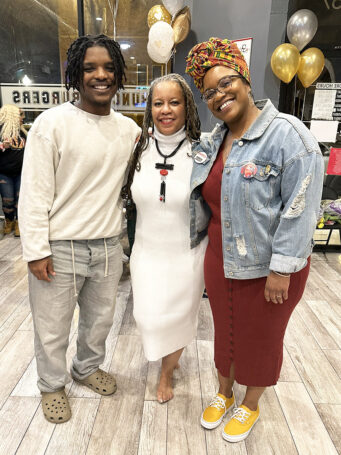 The Chicago Alliance Against Racist and Political Repression (CAARPR) had a major role in building this campaign and encouraging community leaders to run. Of the 112 candidates running, 63 used resources provided by CAARPR to file election paperwork. These 63 members all support real accountability: they want the Chicago Police Department funding to be redirected to violence prevention and transformative justice programs, for care workers to accompany police to mental health crises, and for their churches, block clubs, and community organizations to be included in public safety.
The Chicago Alliance Against Racist and Political Repression (CAARPR) had a major role in building this campaign and encouraging community leaders to run. Of the 112 candidates running, 63 used resources provided by CAARPR to file election paperwork. These 63 members all support real accountability: they want the Chicago Police Department funding to be redirected to violence prevention and transformative justice programs, for care workers to accompany police to mental health crises, and for their churches, block clubs, and community organizations to be included in public safety.
The decade-long struggle also brought in labor, faith, and community organizations rooted in Black, Latino, Arab, Filipino, East Asian and South Asian communities. Describing itself as principally driven “by Black-led organizations such as Black Lives Matter Chicago, Chicago Alliance Against Racist and Political Repression,” the ECPS coalition brought together two struggles that had previously been fighting separately and signed up over 65,000 Chicagoans “through canvassing and tabling mostly in oppressed communities.” Overwhelming support came from Black, Latino, and white communities on the South and West Sides, in Little Village and Pilsen, on the Northside, and in Bridgeport and Back of the Yards. Without collective community involvement, and without the ten years of grassroots engagement with individuals who have been directly impacted by racist police violence, the struggle could not have been won.
These organizations understand that the success of the District Councils lies in the demands and needs of the community itself, with each demand showing that the community can lead its own path toward police accountability.
We must come together
The Chicago Police Department (OPD) equally understands that the threat of community empowerment represents a threat to their unlimited power. The Chicago Fraternal Order of Police (FOP) not only ran their own candidates in a number of districts, but also poured $25,000 into their campaigns. In the 16th and 22nd districts, or in neighborhoods like Galewood and Mount Greenwood where many police live, nearly everyone running has ties to the FOP. But this pressure has not stopped community members from running, because they have a personal and political understanding of the problem. They understand that the police will do everything they can to prevent them from exercising power.
The Communist Party USA is also a part of this movement, understanding that it reflects the collective needs and demands of working-class and democratic movements.
In the 1970s, the CPUSA was a founding organization of the National Alliance Against Racist and Political Repression, and the party participated in the organization’s national refounding in November of 2019. As stated in a pamphlet recently issued to help push the struggle forward, the CPUSA “views the demand for community control of police as central in the struggle for Black lives to tilt the balance of forces toward democratic movements and to stop the killing of racially and nationally oppressed people in the United States by the police.”
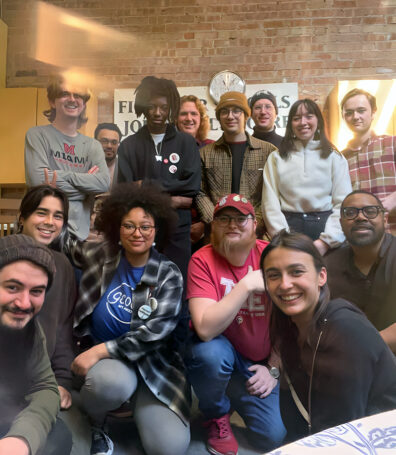 Members of the CPUSA in Chicago and around the country have been active in campaigns to win community control, and local clubs raised money to send their members to Chicago. While in the city, party members campaigned for community-led District Council candidates, participated in phone banks with community members, and wrote articles documenting the historic struggle.
Members of the CPUSA in Chicago and around the country have been active in campaigns to win community control, and local clubs raised money to send their members to Chicago. While in the city, party members campaigned for community-led District Council candidates, participated in phone banks with community members, and wrote articles documenting the historic struggle.
The CPUSA will continue to fight alongside others in Chicago and across the country to ensure that police accountability campaigns are defended, and to work for their success. Party comrades continue to build forces for this campaign, taking vital information and lessons back to our cities in order to establish our own police accountability councils.
Lessons from Chicago
Frank Chapman is the Executive Director of the National Alliance Against Racist and Political Repression (NAARPR), and he spoke on the fundamental importance of having a community-led campaign to stop racist oppression. The campaign first grew to 300 people, then after a further demonstration grew to 500 people. In 2014, they had several thousand people supporting the campaign. Many activists set up tables on street corners with literature, asking community members to sign pledges in support of the organization, or to send postcards to support the legislation.
“We developed a strategy,” Chapman says, “where we would concentrate on organizing in the community door by door, block by block, district by district, to build a mass base of support in the neighborhoods, and in the communities affected by police activity.” By “building a mass base of support in those areas,” they were able to “[use] that mass base of support to [put] pressure [on the] political [representatives in] those areas. In this case, [that meant] meeting the members of the Board of Aldermen to get them to do something.
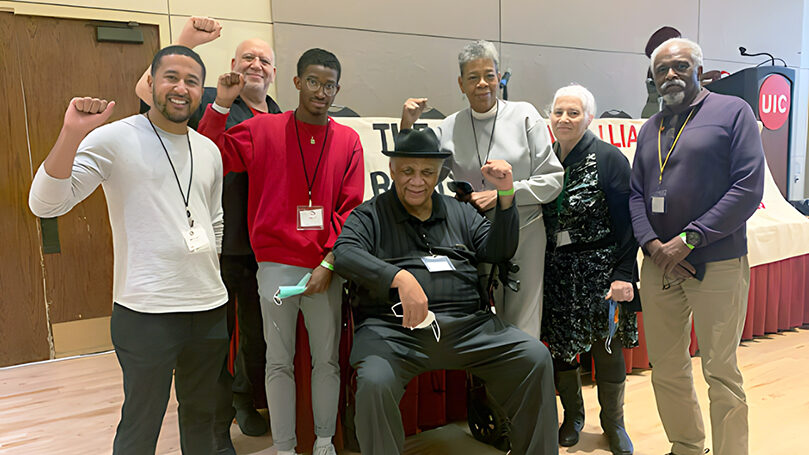
“We wanted them to pass a piece of legislation that we created for … [a] Civilian Police Accountability Council, the CPAC. By 2016, we had over 10,000 people, and that was when we actually introduced legislation into the city council. By George Floyd’s uprisings in 2020 we had 70,000 People. When I say 70,000, I mean 70,000 people we actually talked to about CPAC legislation. We put 100,000 people into the streets. In July of 2021, we passed ECPS into an ordinance. It was enacted. The vote in the city council was 36 to 13 against.”
The coalition included Black-led, labor and community organizations that were rooted in the community. “[We had] the Chicago Teachers Union, we had SEIU [Local 73], and we had about a dozen other unions that endorsed ECPS,” Chapman says. “We had several churches. The United Church of Christ — we were on that network. We had Jewish synagogues. We had Muslim temples. We had all sorts of neighborhood organizations — community-based organizations. So, we had about 150 different organizations.”
These organizations were able to build unity in the struggle for accountability with a focus on addressing the pain community members have experienced at the hands of the police.
Movements throughout the country can take these lessons and apply them to the specific conditions within their own cities.
The Chicago Alliance Against Racist and Political Repression also created a voter guide as an educational tool showing which candidates were connected with the Chicago police departments and which were prepared to fight alongside the movement for community control of police. It takes a united community fight back against racist and political oppression to win the struggle for justice and democracy!
Images: Chicago Alliance Against Racist and Political Repression (Facebook); Protest against police violence – Justice for George Floyd by Fibonacci Blue (CC BY 2.0); CAARPR activist Arewa Karen Winters celebrates her election victory for the 15th District Council by CAARPR (Twitter); Detroit YCLers participate in District Council election mobilizations by YCL Detroit (Twitter); CPUSA members at the 2021 NAARPR conference in Chicago with Frank Chapman, seated (Eric Brooks / People’s World)


 Join Now
Join Now